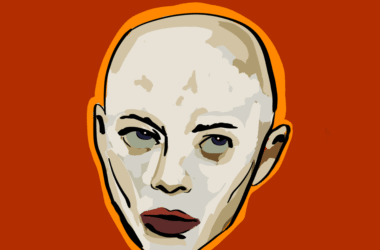 Simon Poitrimolt / McGill Tribune
Simon Poitrimolt / McGill TribuneAugust Strindberg’s A Dream Play is a trailblazing masterpiece-surreal before the Surrealists, Brechtian before Brecht, and Kafkaesque before Kafka. Yet it is as bonkers as it is brilliant, with a plot mad enough to cause mental breakdowns. Because the scenes are so loosely interwoven, it is as difficult to direct as it is to interpret. The McGill Department of English drama and theatre consequently took a serious risk in choosing to produce it.
Fortunately, such a risk was well-calculated; their production is an absolute tour de force. Even before the performance starts, the audience is completely immersed in the surreal surroundings: the music is eerie; Moyse Hall looks spectacular, yet curiously unfamiliar. Maybe this unfamiliarity has something to do with the weird, disheveled lime tree on stage right, though it probably has more to do with the fact that we-the audience-are all seated on stage, facing the stalls, where a quirky set of spectators appear to be watching us.
The play itself follows similarly topsy-turvy rules, the scenes playing in a sporadic sequence, moving backwards and forwards in time and space, conforming-as would be expected from the play’s title-to the logical progression of a dream. The plot is centred on the Vedic god Indra’s daughter (Rachael Benjamin; Claire Horn; Elizabeth Conway-yes, her part has been split into three to add to the confusing melee) and her pseudo-messianic journey to earth to discover the human condition. Played with exceptional panache by the three actresses, the daughter(s) meet with the high and low of society, including the poet(s) (Melissa Keogh; Tara Richter Smith; Gabriela Petrov-also split into three) and the officer(s) (Maxwell Lanocha; Mathew Stevens; Michael Ruderman), only to resolve frequently that “human beings are to be pitied.”
It is a bleak indictment. Yet the show remains wonderfully zany, brought to life by first-rate acting from the entire cast. Many of the actors take on more than one role, swapping seamlessly between each of their parts. The show is also festooned with countless unforgettable individual performances: Johanu Botha produces a sterling portrayal of ‘The Quarantine Master,’ brilliantly playing him as a cross between a demented Zorro and Hunter S. Thompson on LSD; Cory Lipman plays an equally eyebrow-raising performance as the curiously randy, tweed-clad, clown-nosed lawyer; Zoe Erwin-Longstaff pulls off a superb cameo as the creepy, (yet strangely sweet) Kristin; and Eleanor Faulkes is outstanding as the ferociously stubborn dean of theology.
The show is blessed by two excellent directors (Professor Myrna Wyatt Selkirk; Natalie Gershtein). The inversion of the stage and the stalls is a great decision, adding intimacy to the proceedings and distorting the line between reality and performance. Equally inspired is the decision to blend A Dream Play with such impressive physical theatre. And splitting the parts of the poet, the officer, and the daughter proves effective in allowing each actor to bring their own unique interpretation to each role.
Meticulous preparation shines through in many other aspects of the show as well: the lighting (Eric Chad) is terrific, with vast projections covering the Moyse Hall in stars, trees, forests and mountains; the costumes by the costume team are perfectly designed to capture the early 20th-century feel of the performance, their use of macabre Venetian masks succinctly conveys the characters’ scars of thwarted hope, and the clown noses cleverly underscore the savage satire underpinning the play. The set, designed by Claire Stewart, is also designed intelligently, with podiums placed among the stalls to accommodate the unusual staging. The choreography (Kallee Lins; Nicole Rainteau; Natalie Gershtein) is quick-paced, elegant, and creative.
Through such an exceptional production, many of the poignant ideas nestled in Strindberg’s work to take flight: the folly of authority, the delusions of hope, the limits of love and human knowledge, the dilemma of faith, and the liberating powers of the creative instinct. With such an array of talent on display from all facets of this performance, it is hard to even dream of a better production taking place at McGill any time soon.
A Dream Play runs March 29-31 at 7 p.m. in Moyse Hall. Email [email protected] to reserve tickets. $5 for students.






